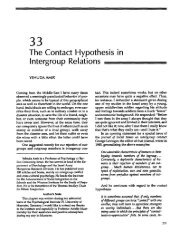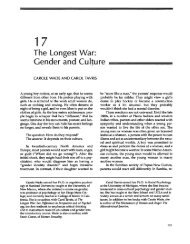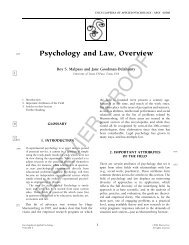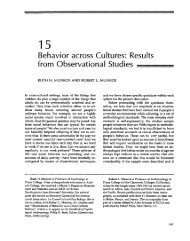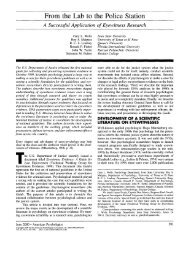Culture shock due to contact with unfamiliar cultures.
Culture shock due to contact with unfamiliar cultures.
Culture shock due to contact with unfamiliar cultures.
Create successful ePaper yourself
Turn your PDF publications into a flip-book with our unique Google optimized e-Paper software.
Online Readings in Psychology and <strong>Culture</strong>, Unit 15, Chapter 8http://www.ac.wwu.edu/%7Eculture/Bochner.htmexceptions <strong>to</strong> this pattern. The his<strong>to</strong>ry of humankind is full of examples of persons and groups whotravelled <strong>to</strong> foreign lands for a variety of purposes, the main ones being <strong>to</strong> work, study, teach, conquer,assist, have fun in, or settle in the country. The journals of Captain Cook, Marco Polo and Chris<strong>to</strong>pherColumbus provide very good descriptions of what we have referred <strong>to</strong> elsewhere (e.g. Ward, Bochner& Furnham, 2001) as between-society culture <strong>contact</strong>. Modern day examples include employees ofinternational organisations, guest workers, overseas students, <strong>to</strong>urists, immigrants, refugees,missionaries, and peacekeepers.Between-Society ContactThe term between society culture-<strong>contact</strong> refers <strong>to</strong> individuals who travel beyond their countries oforigin for a particular purpose and for a specified period of time, and the relationships they establish<strong>with</strong> members of the host society. The term sojourner has been used <strong>to</strong> describe such culture travellers,indicating that they are temporary visi<strong>to</strong>rs intending <strong>to</strong> return home after achieving their aims. And theterm host-society member is often employed <strong>to</strong> distinguish the visi<strong>to</strong>rs from the visited. Travellingbetween societies inevitably involves some personal <strong>contact</strong> between culturally dissimilar individuals,and in the case of the sojourner, exposure <strong>to</strong> unaccus<strong>to</strong>med physical and social manifestations. This canbe unsettling, particularly if the transition is abrupt, and is the origin of the concept of "culture <strong>shock</strong>",the subject of this chapter.Within-Society ContactThe term <strong>with</strong>in-society <strong>contact</strong> describes inter-ethnic relationships in multi-cultural societies. Successfulmulti-cultural countries may contain many diverse ethnic groups integrated by institutional arrangementsthat support shared values and produce a common sense of nationhood. The United States from itsearliest days was characterised by a great deal of internal diversity. In such social systems people willinevitably meet others who are dissimilar <strong>to</strong> themselves in appearance, ancestry, values and cus<strong>to</strong>ms. Incountries that favour ethnic diversity, such cross-cultural <strong>contact</strong> enriches the lives of its citizens. Theopposite is the case in countries where inter-group relations have an ethnocentric bias.Between-Society <strong>Culture</strong> ShockDuring the last 40 years, the incidence of humans shifting across national boundaries has greatlyincreased. Reasons include the invention of the jumbo jet that made international travel quicker, easierand cheaper. Changes in the world economy have also played their part. The term "globalisation" ismuch in the news nowadays, and relates not only <strong>to</strong> industry and commerce, but also <strong>to</strong> education andleisure. For example, in 1999 overseas assignments by United States companies exceeded 350,000business persons, a figure that does not take in<strong>to</strong> account all the other nations sending their executivesabroad. It has been estimated that at any given time there are about a million and a half students andscholars attending educational institutions abroad. The figures for <strong>to</strong>urists are even greater: The WorldTourism Organisation has projected that by the year 2010 the number of international <strong>to</strong>urist-relatedjourneys will rise <strong>to</strong> a <strong>to</strong>tal of 940 million trips per year.Natural and human-made disasters such as floods, famine and regional conflicts also play a major role instimulating cross-cultural travel, and include growing numbers of refugees, immigrants and guest2 of 10 3/19/06 5:38 PM



